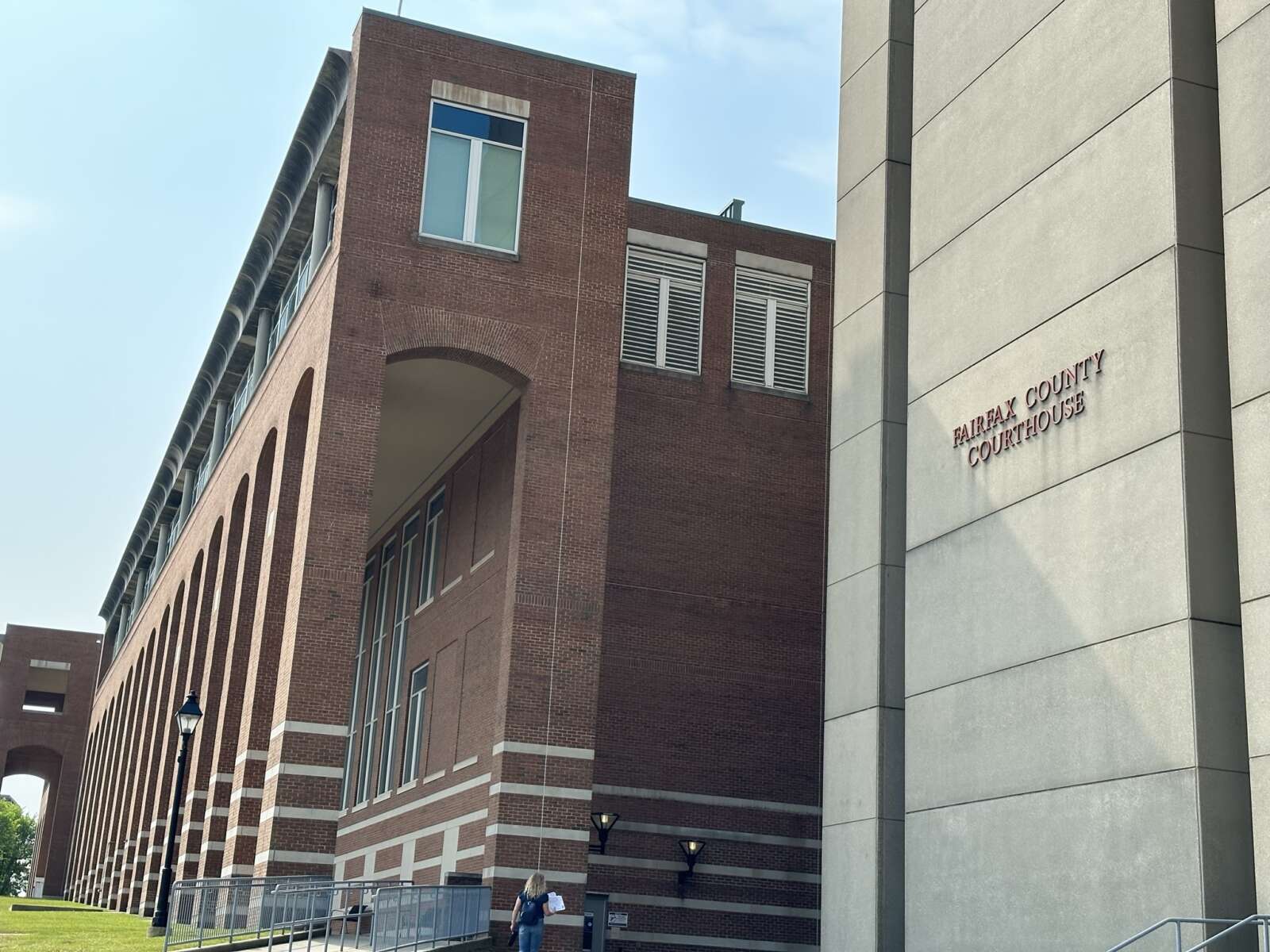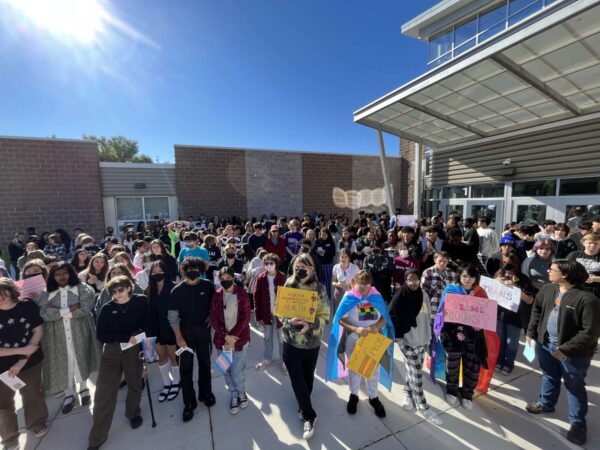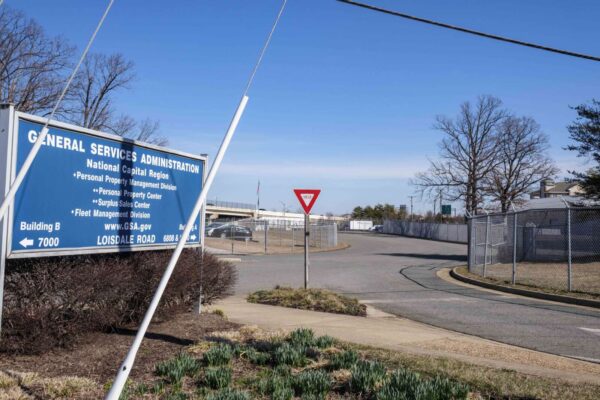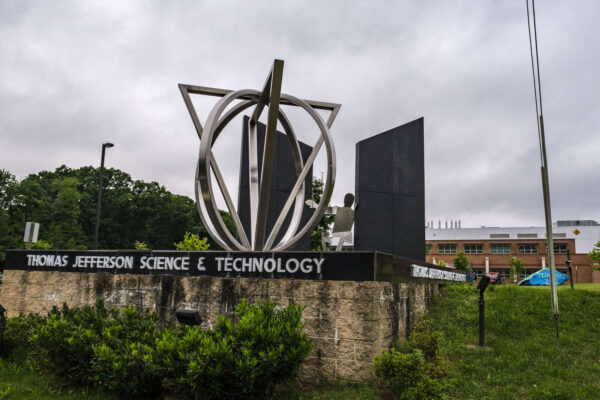
A Fairfax County judge is weighing whether to throw out a lawsuit from environmental groups challenging Republican Gov. Glenn Youngkin’s effort to remove Virginia from a regional carbon market.
Judge David Oblon heard oral arguments from Virginia Solicitor General Andrew Ferguson and Southern Environmental Law Center Senior Attorney Nate Benforado Friday morning in Fairfax Circuit Court. The hearing, which lasted about 30 minutes, concluded with the judge saying he would take the case under advisement before issuing a written decision.
Ferguson argued on behalf of the State Air Pollution Control Board, the Department of Environmental Quality and DEQ Director Mike Rollband to dismiss the lawsuit filed by SELC on behalf of Faith Alliance for Climate Solutions (FACS), Appalachian Voices, Interfaith Power and Light and the Association of Energy Conservation Professionals. The suit challenges Youngkin’s regulation to remove Virginia from the Regional Greenhouse Gas Initiative.
The Regional Greenhouse Gas Initiative, or RGGI, is a multi-state carbon market that requires electricity producers to purchase allowances to emit carbon. The allowances are then returned to the states; in Virginia, those proceeds are funneled into energy efficiency and flood resilience programs.
Youngkin, even before he became governor, has alleged that RGGI creates a “hidden tax” on Virginia utility customers, since utilities in Virginia are allowed to recover costs for the allowances from their ratepayers.
In July, the administration published the regulation to repeal Vrignia’s participation in RGGI at the end of this year.
Environmental groups have decried the withdrawal since Youngkin began pushing for it by citing the funds – over $500 million – it directs toward reducing energy bills for customers by helping homes conserve energy better and preventing flood damage through planning and infrastructure projects.
On Friday, Ferguson opened arguments by stating that out of all the plaintiffs, only the Association of Energy Conservation Professionals had demonstrated any harm worthy of a lawsuit because the group claims that they work with professionals who rely on the revenues the state receives from RGGI. The suit from the other groups, including Fairfax County-based FACS, doesn’t demonstrate that the other entities are directly impacted by the loss of any RGGI revenues, and should be dismissed, Ferguson argued.
The environmental groups could also have jurisdiction in Floyd County, where the Association of Energy Conservation is based, in Richmond where Interfaith Power and Light is headquartered and in Charlottesville, where the Southern Environmental Law Center is based, Ferguson added. He said that in the interest of “judicial economy,” the case should be dismissed entirely and not allowed to be transferred elsewhere, to prevent the plaintiffs from searching for favorable venues. Read More

Virginia is beginning to create plans for how to reduce greenhouse gas emissions, the primary driver of climate change, on a state and regional basis thanks to millions of dollars from the federal government.
This June, the U.S. Environmental Protection Agency awarded about $6 million in grants to Virginia’s Department of Environmental Quality, regional planning organizations in Northern Virginia, Richmond and Hampton Roads and the Monacan Indian Nation to create two plans.
One, the Priority Climate Action Plan, will identify projects that can immediately start reducing greenhouse gas emissions. The other, the Comprehensive Climate Action Plan, aims to craft long-term strategies to achieve reductions.
“This grant will help us plan for reducing climate pollution and promoting climate resilience in the commonwealth, both of which are central to our mission,” said DEQ Director Mike Rolband at a webinar last week. “Just as changing climatic conditions impact all of Virginia, these changes also impact all of the environmental programs here at DEQ. “
The funding for the Climate Pollution Reduction Grants program comes from the Inflation Reduction Act, major federal legislation passed last year that aims to spur investments in climate technologies.
The priority plan is due in March 2024. Projects included in the plan will be eligible to compete for an additional $4.6 billion round of grants for implementation.
The comprehensive plan is due later, in July 2025, and will involve broader strategies for reducing emissions from the transportation, electricity and other sectors, as well as an analysis of the benefits of greenhouse gas reductions.
Both plans require that officials consider the benefits of reductions for low-income and disadvantaged communities and monitor emissions.
Statewide plan
Virginia’s Department of Environmental Quality will be the lead agency coordinating the state’s planning process, which will include the Virginia Department of Transportation, Department of Housing and Community Development, Department of Conservation and Recreation and other agencies.
Virginia has already taken a number of significant steps to reduce greenhouse gas emissions, many of which DEQ cited in its application to the EPA.
The 2020 Virginia Clean Economy Act seeks to decarbonize the state’s electric grid by 2050 by setting renewables development targets for regulated utilities and mandating that increasing portions of their generation be carbon-free. In 2021, Virginia also tied its vehicle emissions standards to California’s rather than remaining on the federal standard in an effort to drive greater adoption of electric vehicles, and the state is planning to use National Electric Vehicle Infrastructure program funds for charging infrastructure buildouts.
Additionally, Virginia since 2021 has participated in the regional carbon market known as the Regional Greenhouse Gas Initiative, or RGGI. That program requires electricity producers to pay for allowances for each ton of carbon they emit and returns the revenues to the state for energy efficiency and flood preparedness programs. Read More
Fairfax County Public Schools has officially announced that it will not implement the Virginia Department of Education’s recently finalized model policies regarding transgender and nonbinary students.
Yesterday (Tuesday), FCPS Superintendent Michelle Reid released a statement confirming that FCPS won’t adopt the new guidelines after a “detailed legal review” found that its current policies are “consistent” with state and federal law.
The statement notes that gender-expansive and transgender students will continue to be referred to by their chosen names and pronouns, given access to school programming and facilities based on their gender identity, and “have their privacy respected,” regardless of their gender identity or legal sex.
“Let me be clear that FCPS remains committed to fostering a safe, supportive, welcoming, and inclusive school environment for all students and staff, including our transgender and gender expansive students and staff,” Reid wrote. “We believe that supporting our students and working with parents and caregivers are not mutually exclusive; we already do both and will continue to do so. We know that students can only learn effectively when they feel safe and supported.”
The policies that FCPS plans to keep in place directly oppose Gov. Glenn Youngkin’s guidance, which has two main requirements:
- Students must participate in school activities and use school facilities according to their sex legally assigned at birth rather than gender identity
- Parents must provide written consent if a student wants to go by a name and/or pronouns that differ from what appears on the student’s official records
Youngkin has characterized the policies as keeping parents involved “in conversations about their child’s education, upbringing, and care.”
Waves of backlash from LGBTQIA+ advocates have rippled across the state since late 2022, when Youngkin first announced his proposed changes to former governor Ralph Northam’s previous policies.
FCPS Pride, an LGBTQIA+ advocacy organization for employees and other adults affiliated with FCPS, played a leading role in advocating for FCPS to take a firm stance against Youngkin’s policies and in favor of transgender and gender-expansive student rights.
FCPS Pride co-chair Robert Rigley Jr. says the state guidelines — which he nicknames the “Don’t Be Trans” policy — make transgender and non-binary students feel unwelcome in Virginia schools and “remove civil and human rights.”
“[The policy] makes it so that some adults have veto power over someone’s gender identity, which from a queer person’s point of view is absurd,” Rigley Jr. said. “…It steals agency in particular from transgender children. It says that you are not in control of your identity at a very basic level, and it turns families and schools against one another, battling over children who are among the most vulnerable children in this state.”
“It traumatizes a whole generation of queer kids in Virginia,” he continued.
FCPS Pride and nine other community organizations held a rally at Luther Jackson Middle School (3020 Gallows Road) in Merrifield. Originally intended as a protest for FCPS to take a clear stance against Youngkin’s policies, the rally transformed into a celebration after the release of Reid’s statement. Read More

Several environmental groups, including one based in Fairfax County, have joined forces to challenge Gov. Glenn Youngkin’s decision to pull Virginia out of a cross-state initiative aimed at reducing carbon emissions.
The Southern Environmental Law Center announced on Monday (July 31) that it will appeal Virginia’s planned withdrawal from the Regional Greenhouse Gas Initiative (RGGI), a market of 12 states on the East Coast that regulates carbon emissions from power generators.
The appeal will be filed in Fairfax County Circuit Court on behalf of Appalachian Voices, the Association of Energy Conservation Professionals, Virginia Interfaith Power and Light and the Faith Alliance for Climate Solutions (FACS), a Fairfax County-focused coalition of religious communities pushing for action to address climate change.
The notice of appeal was served on the same day that the proposal to drop out of the RGGI was published in the Virginia Register, opening a period of public comments until the regulation takes effect on Aug. 30.
“The Regional Greenhouse Gas Initiative…has cut a huge amount of pollution from power plants, while protecting Virginians from the increasing impacts of climate change,” FACS Executive Director Andrea McGimsey said. “RGGI helps us leave a better world to our children and grandchildren, and we will continue to vigorously defend Virginia’s participation in this successful, bipartisan program.”
Established in 2005, the RGGI imposes a cap on carbon emissions from power plants in all participating states, requiring generators to buy “allowances” at quarterly auctions for every short ton of carbon they produce.
On Jan. 1, 2021, Virginia became the first southern state to join the initiative under then-governor Ralph Northam, who also signed legislation mandating an end to the use of coal-fired power plants after 2024 and requiring Dominion Energy to go carbon-free by 2045.
However, Youngkin issued an executive order on Jan. 15, 2022 calling for a reevaluation of Virginia’s participation and signaling his plans to withdraw. He argued that utilities have passed on the costs of purchasing allowances to customers, noting that residents served by Dominion Energy saw an average increase in their electricity bills of $2.39 per month.
Dominion suspended the surcharge after Youngkin announced his withdrawal plan, but last month, the State Corporation Commission approved its return. The fee of $4.44 for a “standard” customer will take effect on Sept. 1, even though the State Air Pollution Control Board voted 4-3 on June 7 to take Virginia out of the RGGI.
“RGGI remains a regressive tax which does not do anything to incentivize the reduction of emissions in Virginia,” Virginia Secretary of Natural and Historic Resources Travis Voyles said in a statement shared by Youngkin’s office. “…Virginians will see a lower energy bill in due time because we are withdrawing from RGGI through a regulatory process.”
Environmental advocates dispute the assertion that the RGGI hasn’t resulted in any benefits. In fact, Virginia saw an over 16% drop in power plant emissions after two years in the initiative based on Environmental Protection Agency data, according to FACS Vice Chair Scott Peterson.
The state also devotes half of its proceeds from the allowance auctions — totaling $250 million over the first two years — to energy efficiency programs for affordable housing and low-income households. Other funds have been used to support resiliency projects, most of them focused on reducing flooding impacts.
“There is a huge need for this funding not just in coastal areas, but also inland communities that are dealing with increasingly frequent intense storms,” Peterson said. “Almost $100 million has already been awarded to 98 different projects, but this work is long term and only getting started.”
The groups challenging the RGGI withdrawal argue that Youngkin’s administration lacks the authority to reverse a law adopted by the General Assembly. Their appeal must be filed in court within 30 days of the notice going to Air Pollution Control Board and Department of Environmental Quality officials.
“The administration cannot brush aside the laws it disagrees with,” Southern Environmental Law Center senior attorney Nate Benfornado said. “Moreover, Virginians deserve to see the continued benefits of this successful program. This program is vital to Virginia meeting climate goals, while reducing air pollution and improving public health.”
Voyles said Attorney General Jason Miyares’s office confirmed that the control board “has the legal authority to take action on the regulatory proposal using the full regulatory process — and the Board voted to do just that.”
Pending the legal action, Virginia will leave the RGGI when its three-year contract ends Dec. 31.
Photo via Ella Ivanescu/Unsplash

After months of review, the Virginia Department of Education has released a final set of policies guiding public schools on how to treat transgender students — including many that contradict the policies currently used by Fairfax County Public Schools.
Released Tuesday (July 18), the “model policies” generally direct schools to require that students use names, pronouns and facilities, such as bathrooms, based on their legal sex as designated in their official school records. All local public school systems are obligated by state law to adopt a version of the policies.
FCPS, which has provided protections for students based on their gender identity since 2020, says it’s now “reviewing” the new policies from the state.
“FCPS remains committed to an inclusive learning environment for each and every student and staff member including those who are transgender or gender expansive,” FCPS Superintendent Michelle Reid said in a statement. “Our schools will continue to be safe and respectful learning spaces.”
Rolling back rules issued by the state in 2021 that let students use names, pronouns and facilities matching their gender identity, the new policies require school employees to refer to students by the name and pronouns corresponding to the sex displayed on their official school records.
Employees can use a different name or pronoun if a parent provides written permission, but even with a parent’s consent, the name and sex in school records can only be changed if a legal document, such as a birth certificate, passport or driver’s license, is provided.
The document says the use of bathrooms and other facilities must also be based on sex, even as it acknowledges that an appeals court found denying students access to bathrooms that correspond with their gender identity to be discriminatory.
Participation in school activities, including athletics, will also be determined by sex, though the state law requiring the VDOE to develop the model policies on transgender students explicitly excluded athletics from consideration.
Gov. Glenn Youngkin lauded the policies as affirming the importance of parents being engaged in their children’s lives.
“The VDOE updated model policies reaffirm my administration’s continued commitment to ensure that every parent is involved in conversations regarding their child’s education, upbringing, and care,” he said in a statement. “Public comment, input, and concerns were carefully evaluated and assessed to formulate the updated model policies.”
All children in Virginia deserve to have a parent engaged in their life and to be treated with dignity and respect.
I am committed to ensuring that every parent is involved in conversations regarding their child’s education, upbringing and care.https://t.co/eywLB6h15n
— Governor Glenn Youngkin (@GovernorVA) July 18, 2023
The policies are largely the same as an earlier draft released last fall that spurred student protests across the state in support of transgender rights and drew over 70,000 public comments.
The Pride Liberation Project, a student-led LGBTQ advocacy group that organized the protests, blasted the final document as “Don’t Be Trans” policies — echoing the “Don’t Say Gay” moniker used by critics for a Florida law that banned discussions of gender identity and sexual orientation in schools.
The VDOE policies represent “an attempt to force LGBTQIA+ students back into the closet,” the PLP said, urging school districts to reject them. Read More

In an unusual show of bipartisan unity, Republican Gov. Glenn Youngkin will attend a press conference tomorrow (Wednesday) with Democratic senators Mark Warner and Tim Kaine and other elected leaders to rally for a Northern Virginia FBI headquarters.
A release from Warner’s office said the elected leaders will hold a press conference in Springfield to lay out the case for bringing the proposed headquarters to Fairfax County.
According to the release:
The press conference comes as the FBI and the General Services Administration (GSA) work to finalize a location for the new headquarters after years of work on the project spanning multiple presidential administrations.
The press conference follows a letter from the Commonwealth’s congressional delegation and Gov. Youngkin, detailing the ways in which Springfield best meets the five selection criteria set forth by the GSA and FBI, which are: support for the FBI mission requirement; transportation access; site development flexibility; promoting sustainable siting and advancing equity; and cost.
The bidding war over the FBI headquarters is possibly the most intense skirmish between Virginia and Maryland since 1865. Virginia is hoping to bring the FBI to a 58-acre site in Springfield, while Maryland is hoping to draw the FBI to Landover or Greenbelt.
The lineup looks like Coachella for Fairfax County elected leadership, with representatives Gerry Connolly, Don Beyer and Abigail Spanberger joining Youngkin and the senators, along with Fairfax County Board of Supervisors Chairman Jeff McKay, Franconia District Supervisor Rodney Lusk, and representatives from other local organizations.
McKay previously accused Washington Metropolitan Area Transit Authority (WMATA) — multiple times — of unfairly trying to tip the scales in favor of the FBI purchasing a Maryland site currently owned by WMATA. Maryland, meanwhile, has argued that proximity to Quantico is being too heavily weighted in favor of Virginia.
The Board of Supervisors approved its own letter to the GSA and FBI last week advocating for the Springfield site, which currently a warehouse for the GSA right next to the agency’s headquarters.
The press conference is scheduled for 8:45 a.m. at Northern Virginia Community College (6699 Springfield Center Drive).

Fairfax County is again asking the state for money to offset anticipated reductions in resident vehicle tax payments.
At a meeting on Tuesday (Jan. 24), the Board of Supervisors unanimously approved a letter written by Chairman Jeff McKay for Gov. Glenn Youngkin, asking him to include money in his budget for localities to blunt the impact of a 15% decrease in car tax revenue.
“We all heard last year the complaints that came in. I don’t think people understand that we don’t set the value of cars. They are set by others,” Chairman Jeff McKay said. “So, the tool that we had in our toolbox was to automatically put a reduction in value on all those vehicles in the county. Even with that, most people’s…tax bills went up.”
Over the last several years, used car prices have increased dramatically, though they’ve started to come down in recent weeks. Because of that, many county taxpayers are paying significantly more in personal property tax — also known as the “car tax.”
Last year, the Board approved assessing vehicles at only 85% of market value in order to give some relief to county taxpayers. That came after Youngkin signed legislation giving localities express permission to do that, in accordance with the Dillon Rule.
However, the county relies on that money as part of its tax revenue to fund services. In 1998, Virginia passed the Personal Property Tax Relief Act, which dictates that the state should offer car tax relief and subsidize localities for lost revenue owed on the first $20,000 of a vehicle’s value.
But the amount of funding provided to localities hasn’t changed since 2007, and Virginia now provides 20% less relief. In other words, both taxpayers and the county government are getting significantly less money from the state than they did 16 years ago.
After cutting another 15% for fiscal year 2023, which began July 1, 2022, the Fairfax County board is asking to get more money back from the state — a request also made to the governor last year, McKay’s board matter notes.
Youngkin has suggested cutting the car tax entirely, but county officials have expressed some trepidation about the consequences unless the money is reimbursed. McKay said reimbursement might be possible now considering the state’s nearly $2 billion surplus.
“While either the state or county could eliminate car taxes all together, the state should honor its pledge of 1998 to eliminate the car tax while reimbursing local governments for lost revenue,” the letter to Youngkin says. “It is essential and possible, particularly as the state currently sits on a significant surplus, to allocate adequate funding to provide residents with effective personal property tax relief.”
Braddock District Supervisor James Walkinshaw argued that the state can’t truly claim to have a surplus until “the Commonwealth pays its bills…and this is an example.”
“If it doesn’t happen this year with the surplus that exists, it ain’t going to happen next year or the year after that,” he said.
While the governor already released his budget last month, amendments — including one to offset lost vehicle tax revenue — could still happen at the direction of the General Assembly.

A South Korean company that makes cheese out of almond milk hopes to ramp up its U.S. presence, starting with an expansion of its American headquarters in Tysons.
Armored Fresh has committed $125,000 to expanding its offices at 1765 Greensboro Station Place with 27 new marketing and sales employees, Virginia Gov. Glenn Youngkin announced today.
The expansion will enable the company to increase its footprint in the U.S. through both online sales and brick-and-mortar stores, according to the news release.
“It is gratifying to support the growth of an international company like Armored Fresh, whose success further strengthens Virginia’s standing as a prime global business destination,” Youngkin said. “The company is advancing food technology with its vegan cheese products, and we are proud that this industry innovation is happening right here in the Commonwealth.”
According to Youngkin, Virginia beat out California, Maryland, D.C. and New York to retain Armored Fresh.
Established in 2021, the company claims to be the first in the world to commercialize almond milk-based cheeses. Its cheese is sold in cubed, sliced, shredded and spreadable forms. All products are free of cholestrol, dairy, gluten and genetically modified organisms, according to its website.
The company made its U.S. debut in September, introducing its products to 100 grocery stores in New York City. An official global launch event was held on Oct. 24, and online sales are set to begin this month.
Per Youngkin’s office, the Virginia Economic Development Partnership worked with the Fairfax County Economic Development Authority to keep Armored Fresh’s headquarters. The Virginia Jobs Investment Program will provide consulting services and funding to support the planned new jobs.
In a statement, Armored Fresh CEO Andrew Yu noted that Fairfax County has “a rich history” in the dairy industry. The county was once home to more dairy farms than anywhere else in Virginia, a legacy kept alive at historic sites like Frying Pan Farm Park and Historic Blenheim.
“Armored Fresh is very excited to bring great-tasting, zero-dairy cheese that everyone can enjoy,” Yu said. “…Northern Virginia and Fairfax County has a rich history in dairy and is advancing in tech innovation. We’re glad to make Fairfax County our home and be part of the vibrant business and innovation community.”
State and local officials alike praised the news: Read More

(Updated at 4:30 p.m.) An outcry stoked by conservative activists over Thomas Jefferson High School for Science and Technology (TJ) allegedly failing to promptly announce a student academic honor has reached the Virginia governor’s office.
In a letter released this morning (Tuesday), Gov. Glenn Youngkin urged Attorney General Jason Miyares to investigate the Fairfax County magnet school after it reportedly didn’t notify students commended by the National Merit Scholarship Program until after early college applications were due.
“We need to get to the bottom of what appears to be an egregious, deliberate attempt to disadvantage high-performing students at one of the best schools in the country,” Youngkin said. “Parents and students deserve answers and Attorney General Miyares will initiate a full investigation.”
Fairfax County Public Schools says it has initiated a third-party, independent investigation of its own but “stands ready to work with our partners at the state level,” should Miyares decide to pursue a review.
“Our preliminary understanding is that the delay this fall was a unique situation due to human error,” an FCPS spokesperson said. “The investigation will continue to examine our records in further detail and we will share key findings with our community.”
The school system said in a statement on Friday (Dec. 30) that families were notified as soon as the lapse “came to light.” Staff also sent emails and made follow-up calls to each college where the affected students had applied.
“FCPS understands the hard work and dedication of each and every student who competes for college acceptance and scholarship opportunities,” FCPS said. “We remain committed to supporting every student in reaching their full potential.”
The National Merit Scholarship Program recognizes students who receive the highest scores in the country on the preliminary SAT, essentially a practice for the main standardized test considered by most colleges and universities for admissions.
According to the National Merit website, about 50,000 students qualify for the program every year based on an index score calculated by doubling the sum of their reading, writing and math scores.
Notifications are sent out in late September, with about two-thirds of those students being commended and one-third advancing as semi-finalists. Only about 7,250 students win actual scholarships each year.
However, FCPS only announced the school’s semi-finalists in September. Commended students at TJ didn’t learn they had gotten the honor until teachers handed out certificates on Nov. 14, Coalition for TJ co-founder Asra Nomani said in the Fairfax County Times.
The Coalition for TJ sued Fairfax County Public Schools in 2021 over changes to the admissions system that were designed to boost diversity at the magnet school. The lawsuit is currently in a federal appeals court.
Nomani said she learned about the issue from Shawnna Yashar, a member of the Fairfax County Parents Association, which was incorporated in June 2021 by leaders of the Open FCPS campaign that urged schools to reopen early in the pandemic.
Since publishing last Thursday (Dec. 29), Nomani’s story has gotten picked up by several, mostly conservative outlets, including Fox News and the Daily Mail. Lt. Gov. Winsome Sears tweeted on Saturday (Dec. 31) that she had “reached out” to Youngkin and Miyares about a possible investigation.
The Fairfax County Parents Association and other groups have called for TJ principal Ann Bonitatibus to be fired and are planning to hold a rally outside the school this afternoon, according to WUSA9.
FCPS confirmed that Superintendent Michelle Reid is scheduled to meet with families this evening “to listen to their concerns.”
Parent and 11th District Republican Committee Vice Chair Srilekha Palle told WUSA9 she considers the delayed notifications “a criminal act.” Harry Jackson, another Coalition for TJ founder and brief GOP school board candidate hopeful, claimed administrators “wanted to downplay the significance of these awards to students in the name of equity.”
“I believe this failure may have caused material harm to those students and their parents, and that this failure may have violated the Virginia Human Rights Act,” Youngkin said in his letter to Miyares.
The letter doesn’t say how the lack of merit scholarship notifications might violate the Virginia Human Rights Act, which protects individuals from discrimination based on race, religion, sex and other characteristics.

(Updated at 5:30 p.m.) The Virginia Department of Education has no clear timeline for when its new policies on the treatment of transgender students will take effect, leaving Fairfax County Public Schools and other local school districts waiting to see if the state makes any changes in response to vocal opposition to the proposal.
It has now been over a month since the state closed its public comment period for the draft “model” policies, which would require schools to identify students based on their sex assigned at birth and prohibit discipline for deadnaming or misgendering a student even if they get their official school records changed.
“The model policies document has not been finalized. The department is still in the process of reviewing public comment,” VDOE communications director Charles Pyle told FFXnow.
The department received more than 71,000 comments on the policies — some supportive, some critical — while the forum was open from Sept. 26 to Oct. 26.
The policies could’ve taken effect as soon as the comment period ended, but the VDOE said last month that the implementation would be delayed by 30 days under a state code provision that requires a delay if a guidance document might contradict state law.
Opponents of the proposed policies have argued that they would violate the Virginia Human Rights Act, which prohibits discrimination based on gender identity. A section on student participation in athletics also goes against the state law that directed VDOE to create the model policies, which explicitly excluded sports from consideration.
Though the additional 30-day deadline has now passed, Pyle says VDOE has no sense of when its public comments review might finish, citing the volume of comments. The department’s staff can make revisions to the draft guidelines, which must be approved by the state superintendent.
“We have more than 71,000 comments to sort through and the department is exploring options for completing the review,” Pyle said in a statement. “Even after the comments are reviewed, the department will take the time necessary to identify and make any edits identified and warranted by the review.”
The Fairfax County School Board has indicated it won’t adopt the model policies, which contradict its existing policies supporting LGBT students. The Board of Supervisors issued a formal statement opposing them, arguing that they would defy legal precedent and harm transgender and other gender-nonconforming students.
Gov. Glenn Youngkin, who has championed the policies as “protecting parents’ fundamental rights to make decisions for their children,” will be in Fairfax County tomorrow to celebrate last week’s opening of the extended I-66 Express Lanes.
According to a media advisory, Board of Supervisors Chairman Jeff McKay will also attend the ribbon-cutting ceremony in Fairfax Corner, but no policy discussions are expected between the Democratic chair and Republican governor.
“We are guessing the Governor is already well aware of Chairman McKay’s on-the-record staunch opposition to the proposed change in model policies and its impact on Fairfax County families,” McKay’s office said.
After the ribbon-cutting, Youngkin is scheduled to appear in Arlington for an unspecified economic development announcement.

